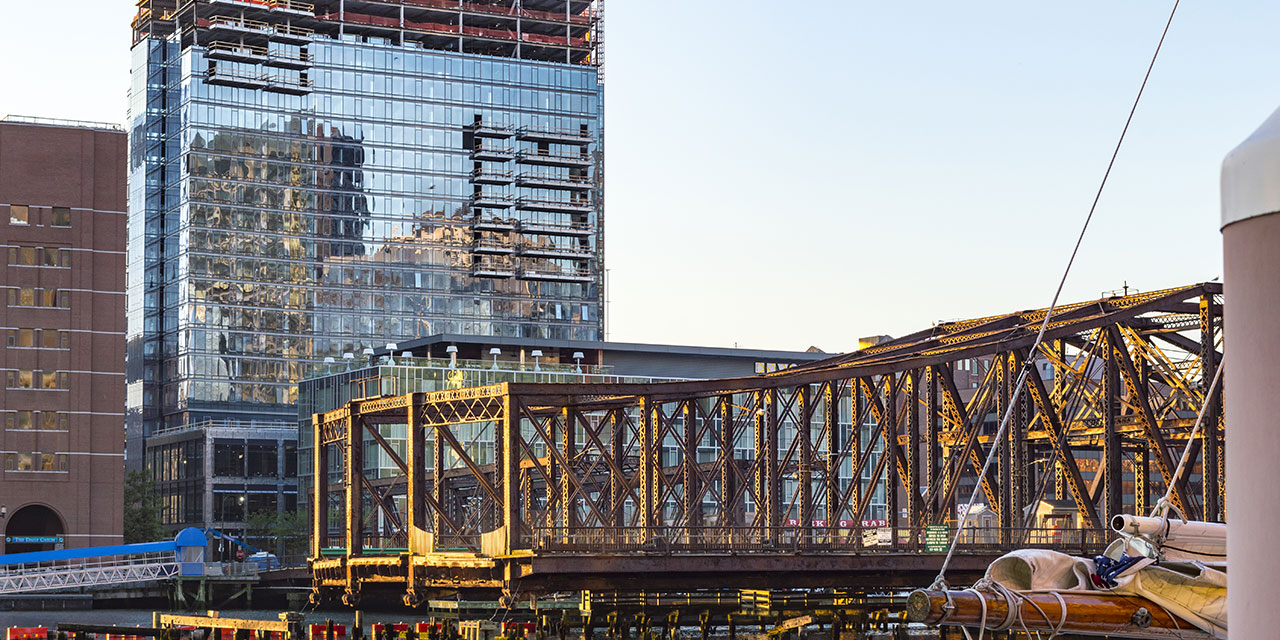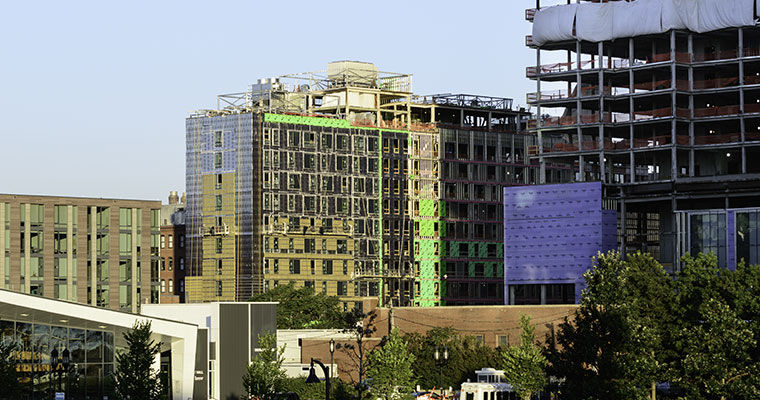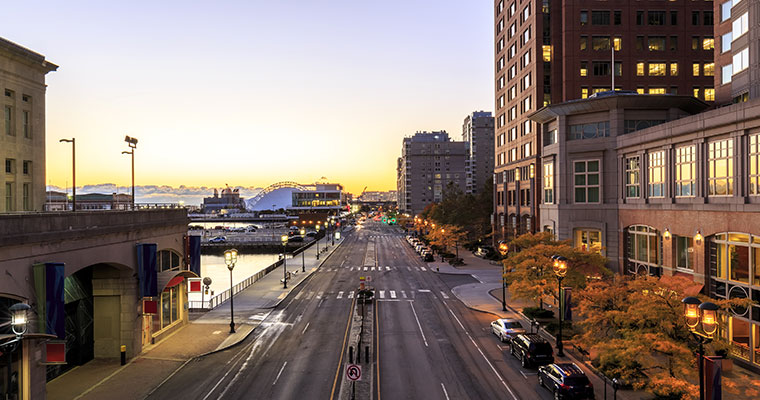A FEW WORDS ON THE LUXURY REAL ESTATE MARKET IN BOSTON

What’s the deal with luxury real estate in Boston these days?
It’s not surprising to anyone who’s from Boston that our city is changing. The skyline is crawling upwards, streets are visibly changing, and more companies are opening shop here than ever before. And yes, the traffic is worse as ever.
But even if you’re new to Boston, it feels like you can hardly turn the corner without seeing a new building going up. From the Seaport, to Southie, Back Bay, the West End and beyond, there’s a plethora of luxury condominiums going up. Even the skyline of Cambridge and Somerville is rapidly changing, and our team at Inphantry wanted to know why.
Well, here’s the deal. After a lot of talks around town, discussions with other agency friends, clients and even informal lunch chats with strangers, we’ve come to find out a few things.
Commercial real estate aside, luxury condos are off to the races to be built by developers around town, and we wanted to find out who, what and why it’s all happening here in Boston.
Keeping a longer story to a minimum, it all has to do with Gen X and Gen Y (the baby boomers), who are getting a bit older, and whose kids have graduated from college. Many of who are no longer in need of these big houses in the burbs. In fact, many of them have been relocating back to smaller, more luxurious spaces in the city for the past few years, all of which has led to this luxury real estate boom in downtown Boston.
And developers and property managers are certainly taking advantage of it.
Taking a quick step back to explain what’s happened, the 1970’s, 80’s and even 90’s were filled with growing families and an uptick in the overall economy. And as families began to grow, a great migration away from the city centers occurred, where everyone began moving out of the cities to have more space to grow their families. At least in Massachusetts, the surrounding towns and cities began to flourish as more and more people became commuters.

Today, those aging couples are looking to move back into the city because access to services are cheaper.
Living outside the city and owning property is expensive. And having a car to commute is also expensive. Not to mention taxes, the general upkeep, access to services and entertainment can also be a hassle when you live outside the city.
With that said, the older generations have grown accustom to a certain level of luxury and wealth. With many of them in the upper echelons of the working class, they have begun to look at moving back into the center of the city, where they are closer to more services and entertainment. Much of which has led to the catalyst of a growing and booming Boston. And with the rise of Uber, Lyft and general T access, many of these couples or individuals looking to live in luxury, no longer even need a car. What many of these individuals would spend on gas, insurance or even upkeep, could all be factored into using one of the many ride-sharing services.
In short, there’s a huge/growing demand to accommodate vast numbers of Gen X and Gen Y.
If you look at LuxuryBoston.com – you’ll find over 17,000 available listings at every two-syllable name in the book in just about every Boston neighborhood. Whether it’s: Pier4, Dalton, Inkblock, Alloy, Ava, Avalon, Mosaic, Radian, Girard, Jordan, Hancock, Maison, Chroma, Lovejoy Wharf, Port45, Slip65, Zinc, Twenty20, Telford, Troy and more – it’s enough to make your head spin with options.
And they’re not just being marketed to Gen X and Gen Y. Anyone with a large enough paycheck, or those willing to sacrifice more than 40% of their income to live in luxury can enjoy spectacular views, have proximity access to prime services and enjoy a secure building with premium amenities.
For instance, look at the Seaport of Boston. Fifteen years ago, it was essentially a wasteland. A free parking lot for those bold enough to leave their cars there from 9-5. Now, with companies like GE, Reebok and so many more calling the Seaport home, they can’t seem to build enough luxury condominiums fast enough in the area.
In the Seaport alone (Boston’s hottest market for luxury condos), they’ve got Pier 4, Channel Center, 437 D Street, 355 Congress, 33 Sleeper Street, The Park Lane, Watermark, Waterside Place, Factory 63, Seaport Crossing, Twenty Two Liberty, Greystar, FP3 Condos and the list goes on and on… but the point is this.

Luxury Real Estate Can’t Be Built Fast Enough in Boston.
So, with demand for luxury real estate at an all-time high for Boston, will the trend continue? With iconic skyscrapers like the 685’ foot tall Millennium Tower, and the array of other luxury buildings going up in every neighborhood in Boston, there seems like there’s going to be no shortage of available spaces (and potential tenants) for people to move into in the near future.
That being said, how will these developments fare against one another? How can they compete in an ultra competitive market where everyone is gunning for the same amenities and access to services? Is it location? Security? Cost? View?
We came across one company who helps market these luxury developments, The Collaborative Companies, who strategically helps developers and property managers convert sales to their premium spaces, but at what cost?
In today’s marketplace, we see brands and companies often go the cheap route. Photos and videos, media buys. A cheap web presence, backed by lackluster consumer experiences.
It needs to change.
Something brands, consumers and especially many big companies in Boston do not get is that experience matters. Especially when we’re talking about Luxury Real Estate. The truth is, selling anything today needs to be a high quality experience. Whether it’s a restaurant experience, or a product one at a box store, consumers will remember and will make future purchasing decisions based on the experience of a single transaction.
And in order to entice these Gen X’ers and Gen Y’ers, you need to experience luxury yourself, not just view it through a web page or your mobile device. That’s why brands are now turning to digital brand experiences to bring their products and offerings to life.
Many of these luxury sales showrooms for these high-priced luxury real estate listings are antiquated equivalents of a 1980’s bank. Something needs to change. And digital innovation should be a key thought-starter for luxury real estate developers.
Invest in the consumer journey, and you’ll see a more solid sales conversion at the end of the pipeline.

Want to see a concrete example of what we mean? Check out the digital brand experience we crafted for Marvin @ 7 Tide and get ahold of us to discuss what we could do for you by speaking with our new business guy, Cam King: cam@inphantry.com.
One More Question: Will The Trend Continue?
The housing market, as it inevitably always does, crashes. From our informal discussions and minimal amount of research, the trend appears to be on a steady track, with tons more developments planned for the City of Boston.
At some point though, people will stop buying them and the market prices will come down. However, that doesn’t appear to look like it’s going to happen anytime soon. Boston is currently the 4th most expensive place to live in the country! Behind San Francisco, New York, and San Jose.
And with no rent cap for the City of Boston, it’s a circus for what landlords are charging around the city. See here for what the average rent prices are around the city.
